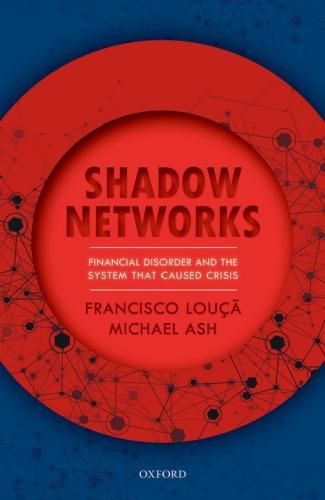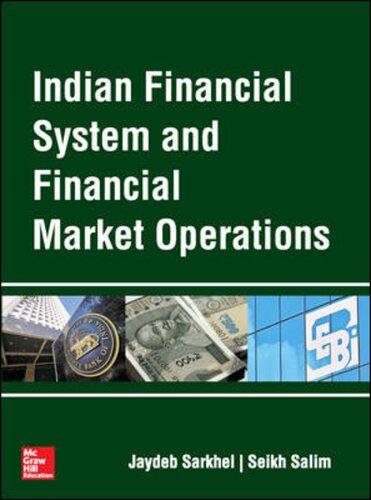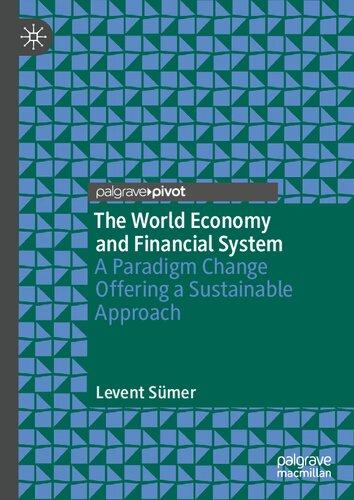Introduction
Thisbookinvestigatestwoquestions,howdidfinancebecomehegemonicinthe capitalistsystem;andwhatarethesocialconsequencesoftheriseoffinance?We donotdwellonothertopics,suchastheevolutionofthemodeofproduction orthedevelopmentofclassconflictoverthelongerrun.Ourthemeisnot thegenesis,history,dynamics,orcontradictionsofcapitalismbut,instead,we addresstheriseoffinancializationbeginninginthelastquarterofthetwentieth centuryandcontinuingintothetwenty-firstcentury.Therefore,weinvestigate thetransnationalizationofthecircuitsandprocessesofcapitalaccumulationthat originatedtheexpansionandfinancializationofthemechanismsofproduction, socialreproduction,andhegemony,includingtheideology,thefunctioningof thestates,andthepoliticaldecisionmaking.Wedonotdiscusstheprevailing neoliberalismasanideology,althoughwepayattentiontothecreationand diffusionofideas,sincewesketchanoverviewoftheprocessofglobalrestructuring ofproductionandfinanceleadingtotheprevalenceoftheshadoweconomy.
Shadowfinance,orthenon-regulatedpartofthefinancialsystem,isacrucial partoftheoperationofbigbanksandfinancialagenciesandlivesintheirorbit, notwithstandingtheimpressivevalueitmanages.Itisaformofeconomicpower. Weexplorethemechanismsofreproductionofthepoweroffinanceandobserve thatthefundamentalcharacteristicsandsuccessesoffinance,withitsrelianceon shadowfinance,havebeenprojectedintoanentireshadoweconomicsystem.
Beginningwithfinance,wediscusshowtheshadowsystemwasdeveloped,how itrecruitsitspersonnel,howitreproducesitsideasandorganizations,howit dominatespoliticaldecision,howitconditionschoices,andhowitspowergrows intheworldofvolatilefinancialmarkets.
Wewillthusdiscusstheshadowsystemandsomeofthetensionsanddangersit creates.Thethreatsarealwayspolitical,butattheendoftheseconddecadeofthe twenty-firstcentury,wefaceacombinationofdangerouspoliticsanddangerous economics.TheimminentperilsareTrumpandhisadministration,thespeculative bubblegeneratedbythemassiveinjectionsofliquiditybythecentralbanks,the mountainofdebtinChina,andthecontinuedfragilityoftheeuro.
Butmarketindicators—“thenumbers”—seemtoindicateotherwise:duringthe firsthalfof2017,theFTSEindexforbankingregisteredspectaculargrowthof 24percent,especiallyfortheUSbanksandinsomecasesfortheEuropeanbanks. Bytheendof2017,theS&P500indexreachedahistoricalmaximumandpeaked at82percentaboveits2007finish.TheEuropeanstockmarkethasbeenexuberant undertheECBandMarioDraghi’sstimuli,andacomfortablewealtheffectamong theownersoffinancialassetsstimulatednewhousingbubbles.Businessseems onceagaintobebackonitsfeet.
Indeed,confidenceabounds.During2017,theanticipatedpayoutstoshareholdersofthemajorbanksoverthenextyearmaydisbursenearlyallbankearnings. Somebanksevendoubledthedividends.ThemammothCitigrouphassetitstotal dividendatahighervaluethanitslikelyearnings.Since2007andallthroughthe longrecession,thelargerEurozonebankspaiddividendsinexcessof40percent oftotalearnings.1Thebigbankersmeanwhileprotestagainstregulationthat wouldimposeasubstantialcapitalreserve,askingforareturntothegloriousand highlyleveragederabeforethesubprimecrisis.Inhis2016lettertoshareholders, JamieDimonofMorganChasecriticizestheincreasedcapitalrequirements;as didBlankfeinfromGoldmanSachs.2Unfazedbytheirnear-deathexperience, bigbanksarebackinbusiness.Theirbusinessisnottraditionalbanking,itis theshadows.
Throughoutthisbookwearguethatadangerousillusionunderpinsthiseuphoria.Overthepastpost-crisisdecadethefactorsofanewcrisishaveaccumulated. Justasthosefactorsthatledtothepreviousrecessionemergedfromdisturbances inasmallnicheofthefinancialmarket,thecurrentprocessisbeingrepeated, undertheimpulseofderegulationandnewwavesofgrowthofshadowfinance. TheEurozone,thespeculativebubblesinthestockmarketorinrealestate,political conflicts,disarrangementsininternationaltrade,collapsesinconfidence,different factorsmayigniteanewcrashoramajorcrisis.ZhouXiaochuan,thegovernorof thecentralbankofChinafor15years,untiltheendof2017,decidedtoleaveoffice withasolemnwarning:a“Minskymoment”maybecoming—asweshallseein thefollowingpages,thatmeansamajorfinancialcrash.3Furthermore,otherfacts threatenstabilityandconfidence:thesuccessivecasesdemonstratingthelossof legitimacyofpoliticalsystems,ifnottheircollapse,extendingfromthecoupsin Brazil,Egypt,andTurkey,tothewavesofvictoriouspopulisminIndia,Hungary, andPoland,andtoevidenceofpoliticalfragilityofthetraditionalpartiesinother countries,suchasSpain,Italy,France,andevenGermany.
Wewillshowthatfinanceisastructuredpowerandamodeofsocialorganization.Financemanagesitsownreproductionthroughsophisticatedmeans mobilizingideology,universities,thinktanks,lobbies,recruitmentandindoctrinationcenters,institutionalconnections,educationofdecisionmakers,andthe naturalizationofmarketsasthecenteroftheeconomyandlifeofpeople.Our investigationofthiscivilizationaltransformationunderlatecapitalismcanmake senseofTrump’selectionandotherrecentdisruptionsofthepoliticalsystemsthat prevailedbetweentheSecondWorldWarandtheGreatRecession.Thegreatest shockofthisdisruptionistheconvergenceofneoliberalpoliticswithauthoritarian solutions,asunmooredpopulistdiscontenthasmobilizedforalternativeswithout sheddingastrictmarketideology.
DOIDEASMOVETHEWORLD?
Wedocumenttheemergenceoftheshadoweconomyandtheroleofdeliberations andactionsbycentralbankers,regulators,governmentofficials,andotherdecision
1 TheEconomist,1July2017,6May2017.
2 Theletterstotheshareholdersareavailable:Dimon(2017)andBlankfein(2016).
3 FinancialTimes,19October2017.
makers.Weestablishthecoherenceoftheircampaignforderegulation,liberalization,andglobalizationprocessesandthedominanceofthispositionintheworld economysincetheturnofthe1980s.
Soareideasormaterialconditionsatthecore?Someofourcolleaguesinsociologyandeconomicsarguethateconomicdoctrinesandcreedsmovetheworld. Noting“Economicsformattingthemarket”oremphasizing“theroleofeconomics asadiscipline,inthebroadsenseoftheterm,intheformattingofcalculative agencies,”MichelCallondefinedaresearchprogramonhow“economicsperforms, shapesandformatstheeconomy,ratherthanobservinghow[theeconomy] functions.”4
Wetakethepositionthatratherthansimplydescribinghowtheeconomy functionsordirectlyshapingtheeconomy,economicsdescribesstrugglesfor powerthatdevelopindependentlyofinterpretation.Forexample,themajorturn representedby1980–1—MargaretThatcher’sdefeatoftheminers’strikeand pushforalargeprivatizationplan,RonaldReagan’sdismissalofthestrikingair trafficcontrollers’union,andDengXiaoping’sconsolidation—representedthe culminationofpreviousdislocationsamongtherelationshipsofforces.Theturn reversedconditionsforthedevelopmentofsociallyorientedpoliciesandinstead promotedneoliberalandprivatizationstrategies.5
Atanearlierpointandatthemoremicrolevelofanindustryanditsleading firms,theelectrical-powerindustryintheUStookshapeasThomasEdisonand J.P.Morgan,theentrepreneurialinventorandthebanker,struggledforcontrol ofthestandardsandregulationsdefiningtheindustry.Therewaslittlerolefor theories,models,oreconomicideas.Sheergreedmotivatedthequarrel,andraw powerdetermineditsoutcome.Thevictorstriumphedthroughtheircapacity toinfluencetheinstitutionsandtocreatethemarkets,morebyforcethanby persuasiveideas.Sobitterandthoroughgoingwasthefightthatitsuccessfully lockedtheUnitedStatesintoaninefficienttechnologyformorethanacentury.6 Economicsalsohasattimesaperformativedimension.TakethecaseofMilton Friedman,someonewhoseworkandcareerwewilldiscussingreatdetail. Friedmanwasamarginaleconomistoutsidethescopeofthegreatsynthesis definingmacroeconomicsaftertheSecondWorldWarandoftentheobjectof derision—untiltheturninpoliticsandeconomicsimposedbythestagflation recessionof1973–4.Hethenquicklyroseinconjunctionwithapoliticalmovement tolaunchaneoliberalreconstructionofthesocialcontractandtherelationship amongthedifferentsocialclasses.Themajorturninsocialrelationsandeconomic strategiescalledforFriedmanandrescuedhisideasfromoblivion.Threedecades later,theriseofhisradicalideaswouldbeheraldedasthe“AgeofFriedman.”
Thenotionthateconomistsmake,oratleastinfluence,marketsdeservessome attention,inanycase.7Socialfactsandeconomicprocessesaretheprimemovers, butthereisarelevantandcreativeroleofideasintheformationofnetworks ofsocialcohesionandinpatternsofdecision.Thepowerofrecognizedexperts andthemimeticbehaviorofdifferentuniversities,thinktanks,governments,and
4Callon(1998),pp.23,46.
5Mason(2009),Cowie(2010),J.Stein(2010),Madrick(2011),Frank(2012),andGalbraith(2015), areamongtheanalysesthatdocumenttheturn.
6 GranovetterandMcGuire(1998). 7 MacKenzie,Muniesa,andSiu(2007);Kennedy(2016).
institutionsarerobustprocessesforthedefinitionofsocialnorms,ofestablished ideas,ofpublicopinion,andevenofelectoralmajorities.Ideasdidnotcreatethe world,buttheyarepartofit;theydonotinventchanges,butcanjustifythem,and justificationsareindeednecessary.Theaccelerationofcapitalaccumulationand thevastincreaseinsocialinequalitywashardforthebroaderpublictoswallow. Acceptanceofthenewsocialandeconomicorderrequiredconvincingarguments presentedbyacoherentideologicalapparatusandademonstrationofconsensus byleadingsocialinstitutions.
Asweshallseeinthefollowingchapters,asshadowfinanceandtheshadow economyimposedtheirrules,thenewregimecalledforarmiesofimaginative deregulators,fearlessliberalizers,independentcentralbankersarguingfortheir liberationfromdemocraticallyestablishednorms,professorsofeconomicsplanningtheindoctrinationoftheuniversitystudentsfromtherichestfamilies,cooperatingthinktanksfollowingwhattheycalled“goodeconomics,”andnetworksof firmsanddifferentinstitutionsfinancing,defining,andapplyingthenewlawof theland.
ATIMEOFLIVINGDANGEROUSLY
OnNovember8,2016,DonaldJ.Trumpwas,tothesurpriseofmany,including theauthors,electedPresidentoftheUnitedStates.USelectoralrulesenabled Trump’selectionwithsubstantiallyfewervotesthanhisDemocraticopponent HillaryClinton.8
Duringthesameelectoralcampaign,aleftinsurgencyintheDemocraticParty ledbySenatorsBernieSandersandElizabethWarren,bothnortheasternpoliticiansidentifiedwithadvocacyforexpandedsocialprotectionsandwithopposition tofinancialinterests,threatenedbutultimatelyfailedtotoppletheClintonian neoliberalholdontheirParty.
Theresultofthiselectionhasledtoadangerousturninworldpolitics.Trump’s publicpositionsduringthecampaignrepresentedanoteworthydeparturefrom theneoliberaldoctrinethatwassharedbydominantactorswithinbothmajor USpoliticalparties.Trumpdeclaredhisoppositiontoimmigrationandtofree trade(withnocommentonthefreemovementofcapital).Hisoppositionto immigrationwasexpressedwithxenophobicandracistclarity.Trump’sopposition tofreetradebrokethoroughlywithestablishedeconomicdoctrine.Trumpblamed tradedealsforthelossofgoodjobsintheUnitedStatesandpromisedtotearup theNorthAmericanFreeTradeAgreementandtoscuttletherapidlyadvancing Trans-PacificPartnership.Thesepromisesapparentlyattractedmanyvotersin thede-industrializingstatesofthenorthernmidwest,thestatesthatcarriedTrump tovictory.
InanadditionalbreakwithorthodoxyintheRepublicanParty,Trumpexpressed opennesstodeficits,declaringhimselftheKingofDebt.Trump’seconomic
8Inthepopularelection,HillaryClintongot2,868,691morevotesthandidDonaldTrump(CNN, 2017).
proposalalsoincludesenormoustaxcutsforthewealthywithappealtothe potentialforjobcreationandtrickle-downbenefits.WhileRepublicandelivery ofthisstandardproposaltypicallyusesaccountinggimmickstomasktheeffect ondeficits,whichtraditionalRepublicansclaimtodeplore,Trumpevincedless concernabouttheeffectonfiscalbalance.Trumpalsopromisedinfrastructure investment—addingaxenophobicspin,themostheraldedinfrastructureproject wasawallontheUS-Mexicobordertokeepout“illegalimmigrants,”afavorite scapegoatofthepopulistwingoftheRepublicanParty.Thepromiseofjobs buildinginfrastructurewasundoubtedlyakeyelementofTrump’selectoral successintraditionallyDemocraticrustbeltstates.Wisconsinhadlastvotedfor aRepublicaninReagan’s1984landslide,andneitherMichigannorPennsylvania hadvotedRepublicansince1988.
NeoliberalscoldsassociatedwiththeDemocraticPartyemphasizedthefiscal irresponsibilityoftheTrumpproposalsbutfailedtocreateanalternativevisionof developinginfrastructure,providinggoodjobs,orimprovingthedistributionof incomewithredistributivefiscalpolicy.9
Trumponomicsisapuzzlefromwhichcoherencehasyettoemerge.Some elements,inparticulartradeskepticismandinfrastructurespending,representa breakwiththeneoliberalconsensus.Otherportions,includingcontinuedfreerein giventofinance,thereductionofsocialprotections,andthelikelihoodthatany infrastructurespendingthatdoesemergewillbecarriedoutintheformofpublicprivatepartnerships,conformsmorecloselytotheneoliberalmodel.
ThereisnoquestionthatTrumpismcarriessomeofthetrappingsofpopulism andright-wingextremism,including,perRobertO.Paxton’sdefinition,an“obsessivepreoccupationwithcommunitydecline,humiliation,orvictimhoodandby compensatorycultsofunity,energyandpurity ... ”10Yetitisnotclearthatareally distinctmodelwillemerge.
Thegreatestlong-termdangersofTrumponomicsaremilitaryspending (includingadomesticsecuritystate)anddenialofclimatechange.Withrespectto themilitary,Trumphasturnedheavilytohawksforpositionsinhiscabinetandhas alreadyseededconflictwithChinawithanostentatiousandprovocativedalliance withTaiwan.Militaryexpenditurehashistoricallyprovenareliablemeansof generatingbipartisansupportforpublicspendingandfiscalstimuluswithout theusualconcernforbalancedbudgets.Trumpisadditionallycommittedtoan overhaulofUSnuclearcapabilities,toleaningonalliestopurchaseAmericanmademilitaryhardware,andtowipingoutIslamistinsurgenciesinsouthwest Asia.Althoughthestimulativecapacityofmilitaryspendingislessthanthatof domesticspending,11militaryKeynesianismremainsapotenteconomicforce. Theriskofescalatingconflictthataccompaniesincreasedmilitaryspendingis substantial.
9Duringthecampaign,Trumpwasevasiveonthesubjectofworkerprotections.Atherspeechatthe RepublicanConvention,Trump’sdaughterIvanka,acloseconfidantandadviser,suggestedsupportfor paidfamilyleavefornewparents—alongstandinggapinsocialprotectionintheUnitedStates.Trump alsoexpressedsupportforanincreaseintheminimumwageto$10perhourfromthecurrent$7.25per hourwhichhasprevailedsince2009.Atthesametime,TrumpcampaignedagainsttheObamahealth carereformswhichextendedhealthinsurancecoveragetotensofmillionsofAmericans. 10 Paxton(2007). 11 PollinandGarrett-Peltier(2009).
Withrespecttoclimatechange,Trumphassurroundedhimselfwithclimatechangedeniersandexecutivesoffossil-fuelcompanies.Chasingkeyvotesin depressedminingstates,TrumppromisedtorestoretheUScoalindustrybylifting regulationsthatheblamedforthedeclineofcoalemployment.Adifficultyfor Trumpisthatmarketforces,inparticular,therapidreductioninthepriceof electricitythankstonewtechnologiesinbothnaturalgasandinrenewables,have likelyplacedthecoalindustrybeyondthehelpofderegulation.Butcoalcanstilldo enormousclimatedamageonitswayoutthedoor.Theconsequencesofinaction onclimatechangearegraveandcumulative.
Forouranalysis,doesTrumpfitintotheshadoweconomy?Intermsofpersonnel,Trump’scabinetisdrawnfromtheelitenomenklaturaoftheshadoweconomy, completewithMBAsfromthebestschools,withC-suiteexperience,andwithlong engagementinthefinancializedeconomy,especiallyatGoldmanSachs.Trump’s men(overwhelmingly)arecoarserandcruderthantheoperativeswhomthey displace.Theycomefromanuglier,xenophobicandracist,partoftheshadows. Trump’sworking-classsupportersexpecttheircandidatetodosomething.Butitis hardtopictureTrump’smensignificantlyinterveningintheflowsoflabor,goods, andcapital,thesystemoftubesthatcarrywealthfortheonepercent.
Intermsofconsequences,theoutcomesarehardertopredict.Thefailureto reckonfullywiththecrashof2007–8andtoacknowledgeandremedythebroad decayofworkingclasswellbeingforagenerationhassownseedsofwhichTrump’s electionisbutonesprout.
Atoneofthemagicmomentsofhiselectoralrun,DonaldTrumpchastened financeas“aglobalpowerstructurethatisresponsiblefortheeconomicdecisions thathaverobbedourworkingclass,strippedourcountryofitswealth,andputthat moneyintothepocketsofahandfuloflargecorporations.”12
Inshort,moneystillrulesWashington.TheenshrinementofGoldmanSachs intheTrumpadministrationsignalsthematurityandresilienceofapolitical andeconomicforceunequaledsincetheHouseofMorgan,theempireofthe
12The NewYorkTimes quotedthisspeechandnotedthecontradiction,asthenomineesforthe newadministrationwerepresentedandthe“elitewasembraced”(30November2016).Beginning withtheelection,Trumprapidlyandfullyalignedwiththemostanti-workerwingoftheRepublican Party.ThefirstnomineeforSecretaryofLabor,anexecutiveofthefast-foodindustry,thesectorof theeconomymostdependentonlowwages,heldsuchalongandflamboyantrecordofoppositionto theminimumwage,overtime,andotherworkerprotectionsthathewasultimatelyforcedtowithdraw fromconsideration.ThecommitmenttooverturningtheObamahealthcarereformsindicatesthatthe populistrhetoricofthecampaigncanfindnoplaceinTrump’sgovernment.
AstheTrumpadministrationtookshape,thefinanciersemergedandtookofficeaspossiblythe richestgovernmentinhistory.TrumpnamedWilburL.Ross,Jr.,aninvestorindistressedassets,as SecretaryofCommerceandbillionaireBetsyDeVos,toheadtheDepartmentofEducation.Elaine Chao,theSecretaryofTransportation,joinsthegovernmentdirectlyfromtheboardofMurdoch’s NewsCorporationandalsoenjoyedexperienceatWellsFargoBank.
PerhapsmoststrikingistherelianceonveteransofGoldmanSachs.StevenMnuchin,aco-investor ofGeorgeSorosandexGoldmanSachsman,servesasthepowerfulSecretaryoftheTreasury. SteveBannon,whoseinterregnumbetweenGoldmanSachsandtheWhiteHouse,wasmarkedby managementoftheright-wingmediasiteBreitbart.com,wasspecialadvisertothePresident.While GoldmanwasmerelyastoponMnuchin’sandBannon’scircuitsthroughpower,GaryCohn,alongtime andseniorSachsexecutiveservedasNationalEconomicAdviser.ThreemonthsafterTrump’selection, sharesofGoldmanSachswereupby36%(TheEconomist,March18,2017).
bankerJ.P.Morgan(1837–1913).PresidentTrumpbuilthisunexpectedtriumph onadeclarationofwaragainstWallStreetandWashington.Trumpevensingled outGoldmanSachsbyname,firstinattacksonhisRepublicanrivalSenator TedCruz,whosewifeisaGoldmanSachsexecutive,thenonhisDemocraticrival HillaryClintonwhosepaidconfidentialspeechestoitandotherbanksdeflated Democraticsupportandconvincedundecidedvotersoftheinsincerityofhermore populiststances,andfinallyinathinlyveiledappealtoanti-Semiticstereotypes aboutsecretleaguesofJewishbankersseekingtocontroltheworld.13
Throughoutthecampaign,Trumpdabbledineconomicpopulism,promising areturntoGlass-Steagallasasymbolofaonce-greatAmericaledbyindustry notfinance,inspiteofthefactthathisaidespromisedtoannihilatetheVolcker Ruleregulatingbanking.Yetimmediatelyuponhisvictory,Trumpwholeheartedly embracedthesecreaturesfromthefinancialswamp.Asamatteroffact,Trump’s campaignand,evenmoreso,hiscabinetpicksrejectedfinancialregulation.As aconsequence,arepealorsubstantialdiminishmentoftheDodd-FrankAct,the relativelymildfinancialreformlawpassedinthewakeofthescandalsandcrash of2007–8,seemslikely.Trump’sdancewithfinancereflectsalongstandingtension ontherightbetweenapopulisttendencyandafundamentalalignmentwiththe goalsofelites.
“Hecanspeaktheirlanguage,”explainedGaryKaminsky,aformervicechairmanofJ.P.MorganStanley,defendingMnuchin’sappointment.14Precisely.
TounderstandthearrivaloftheTrumperaandwhathasandhasnotchanged, weexplorethelanguage,socialbehavior,andrulesandorganizationofthefinancializedeconomyanditsshadows.
THEINTERPRETERSOFTHESHADOWECONOMY
Theshadoweconomyismovedbyeconomicpowers,bysocialgroups,andby acommunityofthought.15Oneimportantcomponentoftheshadoweconomy isthatnetworkofpractitionersandacademics—oftenwithoutsharpdelineation betweenthetwo—whoseauthoritativeclaimstopolicy-relevantknowledgehave reshapedtherules,regulations,andpracticesofmanydomesticeconomiesandthe globaleconomyoverthepastfourdecades.Butbeyondexpertiseandcompetence, theshadoweconomycomprisesoneormoreconcretenetworkswithaccessto politicalandeconomicpower—theabilitytoshapeandmakedecisions.The shadoweconomyisdistinctbecauseofitscapacitytoputideasintopractice.
Inanarticle-lengthobituaryinthe JournalofEconomicLiterature,Andrei Shleiferreferstothiscommunityashedeclaresthepasthalf-centurytobethe AgeofFriedman.16MiltonFriedmanresidesattheintellectualcoreoftheshadow economy.OtherkeyintellectualfiguresincludeFriedrichHayek,JamesBuchanan,
13 Marshall(2016). 14 WashingtonPost,30November2016.
15Haas(1992),p.3,definedanepistemiccommunityas“anetworkofprofessionalswithrecognized expertiseandcompetenceinaparticulardomainandanauthoritativeclaimtopolicyrelevant knowledgewithinthatdomainorissue-area.”
16Shleifer(2009).
andEugeneFama.Thecontributionsofthelattertofinanceandtheconcomitant centralityoffinancearekeycomponentsoftheneoliberaldrive.Itwouldalsobe amistaketoomitAynRandforthe joied’esprit thatshebroughttotheenterprise andherinfluenceonacolytessuchasAlanGreenspanandlegionsofadmiringfans inthequotidianworldofpracticingfinance.Rand,aprimemoveroftheColdWar spiritamongUSintellectuals,contributedtobuildinganedificeofsocialdifference astheanchorofsociallife:asLudwigvonMises,arenownedandinfluential neoliberaleconomist,putitinalettertoheraboutthenovel AtlasShrugged,“you havethecouragetotellthemasseswhatnopoliticiantoldthem:youareinferior andallimprovementsinyourconditionswhichyousimplytakeforgrantedyou owetotheeffortsofmenthatarebetterthanyou.”17
Asanetworkinvolvinginfluentialindividualagents,theshadoweconomyiscertainlynotaconspiracy—itissupportedandinterpretedbyapowerfulintellectual movement,butalsobysocialandeconomicforcesthatemergefromglobalization andcapitalaccumulation.Theyarethesubjectofthisbook.
FEATURESOFTHESHADOWINTELLECTUAL MOVEMENT
Animportantfeatureofaneconomicsystemisresilience,itsabilitytoavertcrises andtorecoverfromcriseswhentheydooccur.Inthecaseoftheshadoweconomy, theresiliencemanifestedintheundauntedresponseofthetruebelieverstothe crashof2008.Theresiliencewhichdemonstratessignificantresistancetocriticism andathickskininthefaceofobviousdisasters.Topronounce,“Whatbubble? Whatcrisis?”in2009,2010,and2011requiredextraordinarycheek.YetEugene Fama,anotherNobellaureate,knownforhisneoliberalindoctrinationinthefield offinance,wasabletoholdtheline.Immediatelyafterthecrash,someofhis followerscouldevenspeakofexpansionaryausteritywithastraightface.
Anotherimportantfeatureofanintellectualsystemisthatitprovidesmethodologicalcompletenessandcomprehensivenessinitscapacitytoaddressnewproblems.Aswewilldiscussinthecourseofthenextchapters,Friedman,Buchanan, Fama,andGreenspanpeddledbothvaluesandanalysisthatgaveguidanceonwhat hadhappenedandwhattodonext.Theirsuccesswasthecreationofideas,tools, andthewilltoapplythemaspartofareconfigurationofthedominantforces ofcapital.
Thesuccessofthismovementalsorequiredthreeothercharacteristics.Itshould becapableofdiscipliningmembership,definingtheboundariesthatcanexclude ormarginalizedeviators,evenhigh-profiledefectorssuchasJamesK.Galbraith, JosephStiglitz,PaulKrugman,andRichardPosner.Itshouldbeabletotranslate betweenintellectualandwealth-generatingworlds,sothatideascanbecome policiesandthedesiredpoliciesbecommunicatedtoacademiatobecomeresearch
17Froma23January1958letterbyVonMisestoRand,reprintedinthe JournalofLibertarianStudies (Winter2007,p.11).Thenovelendswithatraincrash,notattributabletonegligencebuttothevery socialcharacteristicsofthevictims:onewasthebeneficiaryofpublicmoney,anotherwasapublic regulator,anotherusedtoscornbusinessmen,asquotedbyFrank(2012,p.147).
agendas.Thirdly,itrequiresthecapacitytomobilizeatmultiplelevels,frompalace intrigueanddominationofintra-partypoliticswithinthecenterlefttoelectoral success,thecontrolofmedia,andtheproductionofcommonsenseashegemony. Universities,institutes,andthink-tanknetworks,centralbanks,theselectionof professionalsanddecisionmakers,networksinprivate,wealth-generatingactivity, especiallyfinance,willbetheprotagonistsofthisbook.Thisispreciselytheconstructionwewillverifyinthemaking,asweinvestigatetheuniversityconsensus, theeducationandreproductionofelites,theweightofthepowerfulinstitutions, andtherevolvingdoorbetweenpoliticsandbusiness.
SHADOWBANKING IS BANKING
Wehaveadoptedtheterm“shadoweconomy”asanexplicitparalleltotheconcept ofshadowbanking.Shadowbankingbuildsfromthefundamentalcontradiction ofbanking.Bankingmustbeconservative.AsDavidGraeberhasnoted,“Wemust payourdebts”isattheheartofbanking.18
Inoldbanking,banksmakemoneyontheinterest-ratespread,lowinflation, andpresumptionsofrepayment.Bankersseektheassistanceofthestateinkeeping inflationlowlestinflationerodetherealinterestrate.Bankersalsoseekthe assistanceofthestateincollectingdebts.Therefore,oldstylebanksweresupposed tomanageriskandcompetitioninaprudentway;deviationfromthecreedwas notunheardofbutremaineddeviant.
Insteadbankstodaymakebigmoneybynotbeingconservative.Bankersmake moneybymakingmanydealsandbycollectingservicefees.Threedealsarebetter thantwoandsoon.Thetraditionalintermediationofalenderdepositingfunds inthebankandthebanklendingfundstoaqualifiedborrowerprovidesasingle interest-ratespreadand,atmost,twoopportunitiesforfees.Butanextendedchain ofalenderprovidingfundstoamoneymarketfund,amoneymarketfundprovidingfundstoabank,forexample,byareverserepo,abankfinancing(and perhapsoperating)amortgagecompany,andthemortgagecompanyproviding fundstoaborrowerseekingtobuyanewhouseoffersfiveopportunitiesfor feeswithcomplexformalandinformalagreementsforsharingthefeesamong thedealmakers.Bankersmaintaintheselucrativearrangementsbyspecializingin privateandinnovative,or“over-the-counter,”dealsthatarenoteasilysubjectedto competitionbyotherbanks.
Bankersalsomakemoneybymakingleverageddealsthatmaximizeprofitswith minimaloutlaybythebankersthemselves.Bothfeesforserviceandleveraging upprovedhigh-profitactivitiesforbankerswhoformanyyearshadtocontent themselveswithcollectingthespreadbetweentheirdepositorandborrower interestrates.
Butthenewbankingcreatesnewsystemicrisks.Theadditionaldealsinthe lendingchainconstituteaproliferationofinterconnections,amultiplicationof counterpartyrisk,andopportunitiesforinformationalasymmetries,exercisesof
18 Graeber(2011).
power,andconfidenceaboutprobabilitiesthatdivergesfromactualrisks.Thedeals themselvescreatestreamsoffees.Therisksareoftenstructuredsothatsuccess generateshighprivatereturnsforthepartiestothetransactionwhilefailurecanbe spreadtotheunwitting.Therefore,insteadofrisksforindividualbanks(andtheir customers),systemicriskemergesasthemostdangerousformofuncertainty.
Bymakingleverageddeals,bankscreateahighriskfortheirowncapitalandthe capitaloftheirfunders,afundamentalcontradiction.Shadowbanking,ornonregulatedbankingagencies,isameansofextendingthechainandextendingthe leveragebeyondwhatregulatedandinsuredbankingisallowedtodo.
Asweshalldiscuss,shadowfinanceisamorecomplexandcertainlymore profoundsystemthanthatevokedbyamerechangeofmentalitiesandbusiness practicesatthedeskofthebank.Asaconsequence,networksoffinanceand networksofpoliticalpowerlieatthecenterofouranalysis.Innoendeavorhasthe networkbecomemorecentralthaninfinance.Indeed,forthis,shadowbanking hasbeendefinedasnetworkfinancewiththenetworkastheircentralanddefining feature.19Thepoweranddangerofnetworkfinancebecameclearinthemeltdown of2007–8,butthemaphasnotchangedsincethen.Thefirstpartofthisbookwill bededicatedtotheseevents,describingthetsunamiofthefinancialcrash.
CAPITALISMANDFINANCE
Capitalismneedstoknowwhat“capitalisworth.”Thisknowledgeisfundamental fordecisionmaking,forexample,whethertoinvestandinwhattoinvest.
But“whatcapitalisworth”isprobablyunknowable.Theheatedcontroversies amongeconomistsinthe1960sshoweddisagreementsoverwhatcapitalisand whetheritcanbevaluedornot.Ifeverypieceofphysicalcapitalhasambiguous valuebecauseithasavintageandembeddedtechnology,isitselfembeddedin firmsandotherinstitutions,andcanberevaluedveryquicklyiftheenvironment ortheembeddinginstitutionchanges,thenitdoesnotmakesensetotalkabout thevalueofcapital.ThereasonsmightbeMarxianorSraffian—thevalueofcapital dependsontherateofprofitandtherateofprofitisdeterminedinasocialrather thantechnicalprocess—orthereasonsmightbecontextualorenvironmental. Butinanycase,“thevalueofaunitofcapital”haslimitedmicroeconomicand macroeconomicmeaning.
Yetliberalfinancialmarketsseemtoofferanopportunitytoresolvetheproblem. Iffinancialmarketscanassignvaluetocapitalinrealtimethen“whatiscapital worth”issaved.
The q theoryofinvestmentdrawsfromthisfaithinfinancialmarketstoevaluatecapital.In q theory,firmsassesstheopportunityforcapitalinvestmentby comparingthefinancialvaluationthatfinancialmarketswillmakeconcerningthe investmenttotherealconcretepriceofthenewcapital.Ifthefinancialmarket valuationofthebenefitexceedstherealvalueofthecost,thenthefirmisina profitableinvestmentenvironmentandtheacquisitionoftheassetiswarranted.If
not,thenthefirmshouldholdorevendisinvest.Butthisdecisionmakingrubric isviableonlyiffinancialmarketsareaccurateaboutthevaluethefirmwillderive fromthephysicalcapitalinquestion.Ifandonlyiffinancialmarketsareright,then capitalismisOK.Withoutreliablevaluationofcapital,thefundamentalarguments aboutefficiencyfallapart.
Deregulatedfinancialmarketsaresupposedtobeabletodothis,i.e.,toaccuratelyvaluecapital,becauseofincentivestoberightandthelargenumbersofindependentguesses.Financialmarketsaretheoriginalcrowd-sourcinginstitutions, indeedthesourceofthemetaphor,withreferencetothewisdomofthecrowd.
Yetthefundamentalproblemsforthesimplisticnarrativearecorrelationand uncertainty.Withrespecttocorrelation,boththeharshmacrofacts,i.e.,the sharedmacroeconomicenvironmentofallofthemarketparticipants,andthe behavioralproblems—mostlyherding,fromspursofoptimismorpessimism— rendertheguessesirrevocablydependentratherthanindependent.Allofthe practicalwisdomofmodernfinance,inparticularthecapacitytodiversifyaway idiosyncraticrisk,goesoutthewindowwhenglobalmarketsgodownthetoilet. Whatthefinancialcrashesproveisthattheliberaltheoryisworthless.
RADICALUNCERTAINTY
Financeandmarkettransactionsneedlegitimacy.Akeypartoflegitimacyisthatit shouldalwaysbeclearwhowillget—andbyextension,deserve—what.Contracts andthelegalsystemgivetheimpressionofrationalizingandorderingandthereby allayingpotentialconflict.Accordingtothecontract,thepartyofthefirstpart willreceivethisportionandthepartyofthesecondpartwillreceivethatportion. Goodcontractsspellouttheallocationincontingencies,withexcellentcontracts virtuallyairtightagainstcomplicatedcontingenciesandconflict.Poorcontracts failtoaccountforcontingencies.
Thereverenceinwhichcontractsareheldcanbeseenintheextenttowhich theyprotectevenworkersinacapitalistsystem.Failuretopayacontractedwage isagraveoffenseforacapitalist.IntheUS,suchafailureispunishedwith trebledamages—andthisinasystemnotknownforitsgenerositytoworkers. (Exploitationistohappenbysurplusextraction,notprimitiveaccumulation.) Again,thepointisthatcontractsareexpectedtospelloutwhatisgoingtohappen towhom.
Inthefinancialsphere,complexcontractsaretheorderoftheday.Bothvanilla marketcontractsandover-the-countercontractsspecifyhighlycomplexcontingencies.Considertranchedobligationsandcreditdefaultswaps.
Buttherealityoffinanceismuchmessierandstickier.Whenpushcomes toshove,notallcontingenciesareprovidedfor.KatharinaPistorofColumbia Universityargues,indeed,thatcontractssimplycannotprovideforallpossible contingencies.20Thedissolutionofoneofthepartiestothecontract,forexample, isbydefinitionoutsidethetermsofthecontract.
20 Pistor(2013).
Thus,therelevantfinancialandlegalinstitutionsmustbeabletodetermine whoseclaimswillbehonoredinthebreach.Pistorinvokestheconceptof “ElasticityofLaw”inherworktowardsaLegalTheoryofFinance(contrasted explicitlywiththeliberal“LawandFinance”approach).Notallclaimswill behonoredandnotallclaimswillbehonoredequallyinfinancialcrises.The determinationofwhichclaimsareandwhichclaimsarenotfullyhonoreddelimits theElasticityofLawinthiscase.Pistorwrites:“attheapexwheretheverysurvival ofthesystemisatstake,lawtendstobemoreelasticbydesignand/orbecausethe system’sultimatebackstopabrogatesthediscretionarypowertodowhatittakes torescuethesystem.”21
Inadistantpastalreadyfacingfinancialcrises,theBritishjournalistWalter Bagehotenunciatedtheprincipleofprovidingcompleteliquidityforthesolvent andlettingtheinsolventfall.ThecontemporaryextraordinaryextensionofliquidityeventoinsolventfinancialinstitutionsthatdidnotqualifyunderBagehot’s principleconstitutedaclearstretchingoftheboundsandrules.Thiswaselasticity inaction.
Theselectionofthebeneficiariesofelasticlargessewasdefendedonthebasisof systemicnecessity.Bankstoobigtofailor,inthenewparlance,toointerconnected tofail,receivedsignificantassistanceandallowances,intheUnitedStatesand Europe.Evenamongbanks,however,therewasdifferentialindulgence,sometimes atrandomandsometimesviawebsofpower.BearStearnsreceivedabailoutin March2008.LehmanBrotherswaspermittedtofailthatSeptember.Inretrospect thesedecisionsappeararbitrary.
Elasticityisnotrandomlydistributedbutisdishedoutaccordingtoconnectednessandpower.Noelasticitywasavailableforthepoorerperipheralpolitiesof EuropeduringtheEuropeansovereigndebtcrisiswhilemuchslackwaspaidout tothelargebanksheadquarteredinthecore.
But,ifneitherdivinenorgeneticinscriptionmotivatesourinclinationtoward capitalaccumulation,whydomoney,finance,andgreeddominateourlives?This bookprovidesapossibleanswer,discussinghowshadowfinancebecameashadow powerinoursocieties.
SHADOWSEVERYWHERE
Asweshallseethroughthebook,shadowfinancedominatesthedeveloped economies.Itsrisehasimmenseconsequencesandisshatteringourworld.Itis notaconsequenceofanybehavioralconstantorhumanessenceimposinggreed asthepatternoflifeundertheSun.Itisrathertheoutcomeoftheinterplayof institutionalchoices,economicforces,andideologicalimpositions—threefacets ofpower.Thedominanceoftheshadoweconomyandfinanceispartofthelogic ofcapitalevenifitsparticularformandevolutionwerenotpredetermined.
Wewillfocusonthenetworksguaranteeingthisresultoveralongperiodof time.Thefirstgreatnetworkisthatoffirms,inparticularthefinancialindustry,
21 Pistor(2013).
connectinggiantbankstothedomainsofunregulatedcreditandintermediation. Thefinancialindustrycreatedthewondersofsecuritization,securitybeingan ironicnameforproductsthatdeliveredmassiveinsecuritytofinancialmarkets.But thesefirmstransformedthroughtheprocessofderegulation:thebalancesheetsof banksaretypicallylies,sincetheyhidetheirshadowagencies.Regulationbecame notonlyafarcebutalsoapriceyone,giventheamountofpublicbailoutoperations sincethesubprimecrash.22
Financeconstitutesbyitselfadensenetwork.Itiscapableofmobilizingat differentlevels,suchasthroughpalaceintrigue(wewillinvestigatethebattle ofLawrenceSummers,aUSTreasurySecretary,againstBrooksleyBorn,the leaderofaregulatoryagencywhodaredtoproposetoregulatethederivatives); ideologicalauthority(onetellingcasebeingtheargumentfor“expansiveausterity” inEurope);intellectualcomprehensiveness(thecentralbankers’connectionisan example,namelythatoftheFriedmanitedisciples,fromGreenspantoBernanke attheUSFederalReserve),anddisciplinarycapacityimposinghegemony.Todo so,itrequiresasecondnetwork,thatofindoctrinationandselectionofcadre,a networkofprofessionalswithcommonnotions,recognizedexpertiseandshared language,activeinbusinessandgovernmentalike,bridgingoverdifferencesand establishingcohesioninruling.
Itisremarkableinanycasehowtheneoliberalandfinancialparadigmsurvived itsfirsttenyearsofseverefailurebasicallyunscathed.Thestrengthofthese networksgivescluestothesolutionofonehistoricalenigma:whywereneoliberal ideasandactionreplacedbyanothereconomicparadigmafterthe1929crisis, andwhyinsteaddidtheycomeoutofthe2008crashandrecessiondefiantand apparentlyreinforced?Butthewheelisstillinspin.Trump’selectoralsuccessin theUSisamongthemostprominentsignsoftheongoingcrisis.
Theresilienceoffailuremaysurprisesomeoneinattentivetotheconfiguration ofthecentralbanks,theratingagencies,theregulators,thegovernments,andthe universitiesformingtheideasandthepersonnelforthenewworld.Theaccessto politicalandsocialpowerbyfinanceisacharacteristicpartofitsdominanceofthe shadoweconomy.
THEPLANOFTHEBOOK
PartItellsthestoryofwhathappenedduringthefinancialcrashof2007–8andthe crisisthatfollowed(theglobalrecession,the2011Europeaneuroanddebtcrisis, thenthe2014crisisinmanyemergingeconomies).Itcompilesthedefinitions, typesofstructures,andmeasurementsofshadowfinance.Finally,weinvestigate familyandtraditionalbusinesses,seekingtodetecttheirimmenserelevance,and 22Marketsandfirmshavebeenintensionsincetheearlydaysofcapitalism.Inthelatenineteenth century,thebalanceshiftedtothefirmwiththeriseofindustrialgiants,asdocumentedbyChandler andtheorizedbyCoase.Morerecently,financehasenshrinedthemarketoverthefirmbothonits ownturf,withmarketfinancesupplantingbankfinanceandperhapsasormoreimportantlyinevery industrialandservicedomainaswell.













